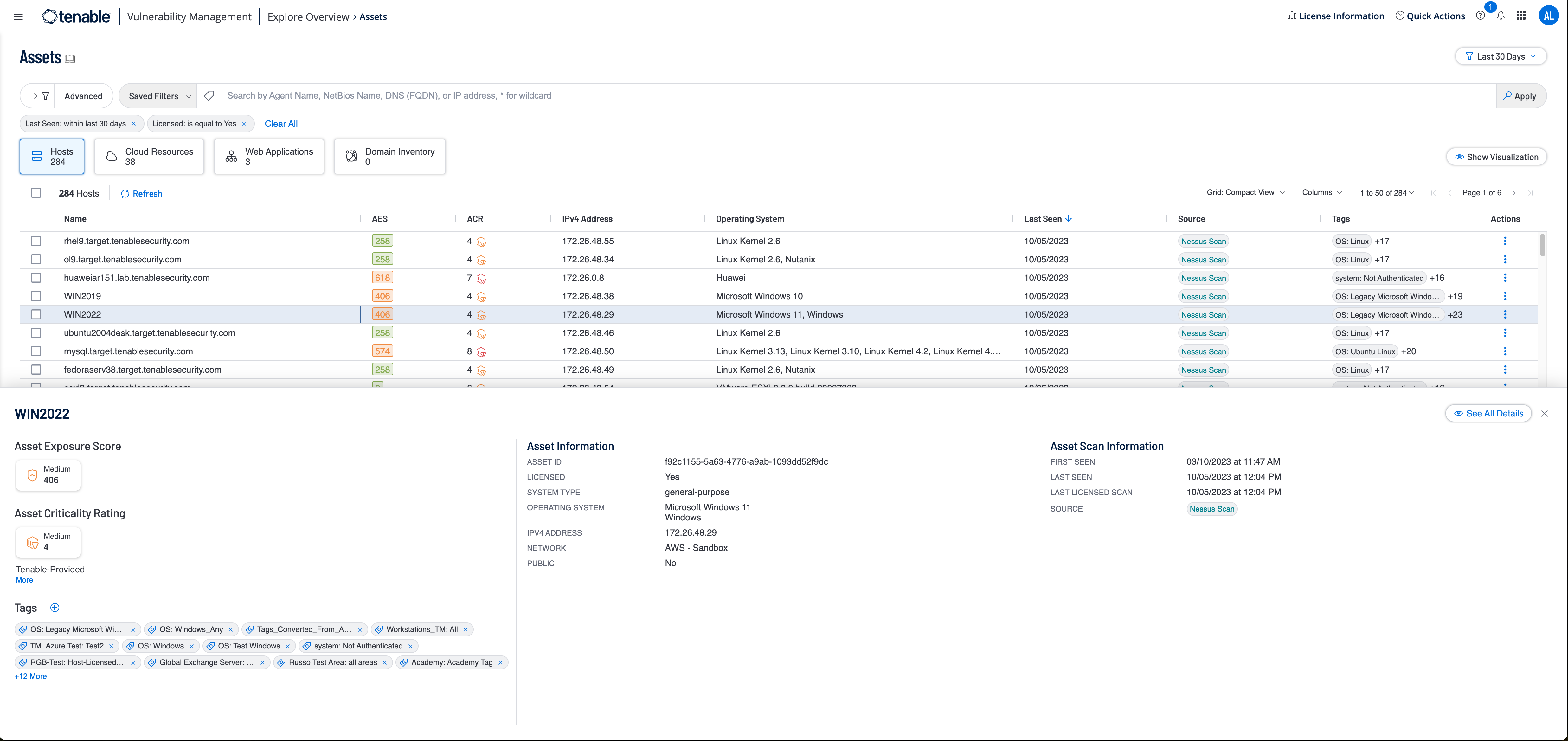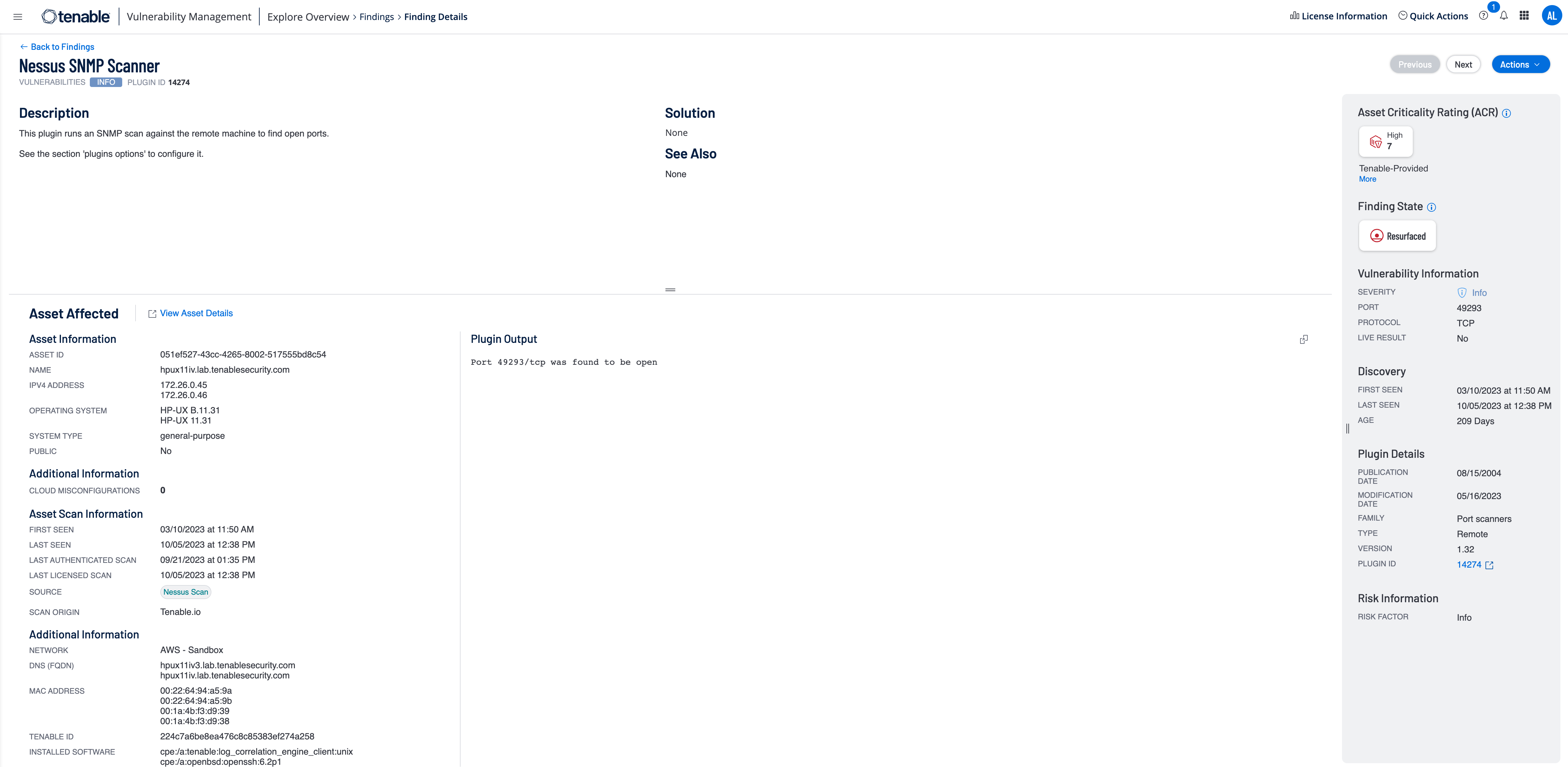Tenable Vulnerability Management FAQ
General Questions
-
What is Tenable Vulnerability Management?
-
Vulnerability Management is a risk-based vulnerability management solution that gives you full network visibility to predict attacks and quickly respond to critical vulnerabilities. Continuous, always-on discovery and assessment provide the visibility you need to find all assets on your network, as well as hidden vulnerabilities on those assets. Built-in prioritization, threat intelligence and real-time reporting help you understand your risk and proactively disrupt attack paths. Built on leading Tenable Nessus technology and managed in the cloud, you get complete visibility of the assets and vulnerabilities on your network so you can quickly and accurately understand your risk and know which vulnerabilities to fix first.
Tenable Vulnerability Management is an integral component of Tenable One, Tenable's Exposure Management Platform. Tenable One builds off of Tenable Vulnerability Management and provides actionable insight into your entire infrastructure's security risks- including cloud instances, web applications, Active Directory (AD) and more, even highly dynamic assets like mobile devices, virtual machines and containers. To elevate cyber risk management even further, you get additional prioritization metrics and capabilities, such as attack surface visualizations, asset criticality ratings, risk-based exposure scoring and peer benchmarking, as well as the ability to track risk reduction over time.
How can I learn more about Tenable Vulnerability Management?
How can I evaluate Tenable Vulnerability Management applications?
How can I buy Tenable Vulnerability Management applications?
Can I license Tenable applications individually?
How is Tenable Vulnerability Management priced and licensed?
What is an asset?
How are other Tenable Vulnerability Management applications priced and licensed?
Does Tenable offer a service level agreement (SLA) for Tenable Vulnerability Management?
Where can I find documentation on Tenable Vulnerability Management?
What IPs does Tenable use for scanning from the cloud?
Can I use both Tenable Security Center and Tenable Vulnerability Management?
Can I migrate from Tenable Security Center to Tenable Vulnerability Management?
What is External Attack Surface Management (EASM)?
Is External Attack Surface Management (EASM) included in Tenable Vulnerability Management?
What is Tenable Web App Scanning?
Where can I learn more about or evaluate Tenable Web App Scanning?
Does the product scan source code or perform static analysis?
Elastic Asset Licensing Questions
Elastic Asset Licensing, built into Tenable Vulnerability Management, is an innovation that aligns vulnerability management licensing with today’s elastic IT environments. Elastic Asset Licensing avoids double counting assets that have multiple and/or changing IP addresses. Additionally, it automatically reclaims licenses from assets that have not been recently scanned, including retired assets and assets that may have been inadvertently scanned.
What is Tenable Vulnerability Management Elastic Asset Licensing?
The primary benefits of Elastic Asset Licensing are:
- Customers purchase the right amount of licenses, based on asset quantities, not inflated IP counts.
- Customers avoid time-consuming and often inaccurate projects needed to reclaim licenses from decommissioned and/or inadvertently scanned assets.
- Vulnerability management metrics are not corrupted by double and triple counting vulnerabilities for assets that have multiple IP addresses.
What customer asset and vulnerability data does Tenable Vulnerability Management manage?
Can Tenable Vulnerability Management customers scan more assets than licensed?
Can Tenable Vulnerability Management customers scan more assets than licensed?
What is an asset?
How does Tenable Vulnerability Management identify an asset?
How are assets different from IPs?
Why are asset counts likely to be lower than IP counts?
How can prospects estimate their asset count?
How do you avoid counting the same asset multiple times?
Data Security and Privacy Questions
Customer data security and privacy is the top priority of Tenable. Thousands of customers, including financial service providers, healthcare providers, retailers, educational institutions and government agencies trust Tenable with their vulnerability data in our cloud platform.
Data security and privacy include not allowing customers to access any data other than their own and ensuring that any non-customer, hacker, bad actor or unauthorized Tenable representative cannot access, disclose, copy or otherwise violate the privacy and protection of the customers' data stored in the Tenable Vulnerability Management service.
Tenable also focuses on the availability and reliability of the Tenable Vulnerability Management service because poor security controls can create problems that, while not a risk to customers’ data, can affect the service availability. Tenable implements and enforces measures to make Tenable Vulnerability Management highly available, guarded against attacks or simple faults and outages, and always usable for our customers.
What customer data does Tenable Vulnerability Management manage?
-
Ultimately, the customer data Tenable Vulnerability Management manages has a single purpose: to deliver an exceptional experience as customers manage assets and vulnerabilities to secure their environments. To that end, Tenable Vulnerability Management manages three categories of customer data:
- Asset and vulnerability data
- Environmental performance data
- Customer usage data
What customer asset and vulnerability data does Tenable Vulnerability Management manage?
Does Tenable analyze or use customer data?
What Tenable Vulnerability Management health and status data is collected?
Can customers opt out of health and status data collection?
What Tenable Vulnerability Management usage data is collected?
Can users opt out of usage data collection?
Where is customer data located?
Will Tenable Vulnerability Managemento support additional countries in the future? If so, what is the timeframe?
Can data be stored in AWS regions other than the original region?
Can a customer force data to remain in a specific location/country?
How is customer data protected within Tenable Vulnerability Management?
How does Tenable perform secure development?
What customer application security is available?
How is customer data protected?
How is data encrypted?
Can customers upload their own keys?
Can customers upload their own keys?
Has Tenable achieved any privacy or security certifications, such as Privacy Shield or CSA STAR?
How is personally identifiable information (PII) protected?
Is customer data separated?
What security controls protect Tenable Vulnerability Management?
How are Tenable Vulnerability Management sensors secured?
How is Tenable Vulnerability Management availability managed?
Where is data replicated?
What disaster recovery capabilities are in place?
Who can access customer data?
How are user roles and permissions managed?
Can Tenable staff access customer data?
Who can use the impersonate function?
Is impersonation activity logged?
Does the data leave the country when Tenable is troubleshooting a technical issue?
Will Tenable support staff have access to a customer’s internal network?
How long is customer data retained within Tenable Vulnerability Management?
How long is active scan data retained?
If a customer discontinues the Tenable Vulnerability Management service, how long is data retained?
How long is PCI-related data retained?
How long is Tenable Vulnerability Management usage data retained?
Does Tenable Vulnerability Management have Common Criteria certification?
Can a customer choose the country where that data is stored?
Does data exist in multiple locations within a country?
PCI ASV
What is PCI ASV?
PCI ASV refers to requirement 11.2.2 of the Payment Card Industry (PCI) Data Security Standard (DSS) Requirements and Security Assessment Procedures that requires quarterly external vulnerability scans, which must be performed (or attested to) by an Approved Scanning Vendor (ASV). An ASV is an organization with a set of services and tools (“ASV Scanning Solution”) to validate adherence to the external scanning requirement of PCI DSS Requirement 11.2.2.
Which systems are in scope for ASV Scanning?
-
The PCI DSS requires vulnerability scanning of all externally accessible (internet-facing) system components owned or utilized by the scan customer that are part of the cardholder data environment, as well as any externally facing system component that provides a path to the cardholder data environment.
What is the ASV process?
How frequently are ASV scans required?
How is an approved scanning vendor (ASV) different from a qualified security assessor (QSA)?
Tenable PCI ASV Solution Capabilities
Is Tenable a certified PCI ASV?
-
Yes. Tenable is qualified as an approved scanning vendor (ASV) to validate external vulnerability scans of internet-facing environments (used to store, process or transmit cardholder data) of merchants and service providers. The ASV qualification process consists of three parts: the first involves the qualification of Tenable Network Security as a vendor. The second relates to the qualification of Tenable employees responsible for the remote PCI scanning services. The third consists of the security testing of the Tenable remote scanning solution (Tenable Vulnerability Management and Tenable PCI ASV).
As an approved scanning vendor (ASV), does Tenable actually perform the scans?
Data Sovereignty
Does Tenable PCI ASV comply with EU data sovereignty requirements?
-
Vulnerability data is not EU DPD 95/46/EC data, so any data residency requirements would be customer, not regulatory driven. EU state governmental organizations could have their own data residency requirements, but those would have to be assessed on a case-by-case basis and probably not an issue for PCI-ASV scans.
Tenable Vulnerability Management ASV Pricing/Licensing/Ordering
Does Tenable Vulnerability Management include any PCI ASV licenses?
-
Yes, Tenable Vulnerability Management includes a PCI ASV license for a single, unique PCI asset. Some organizations have taken great pains to limit the assets in scope for PCI, often by outsourcing payment processing functions. Because these customers are arguably "not in the PCI business," Tenable has simplified its purchasing and licensing. A customer can change their asset every 90 days.
How is Tenable PCI ASV licensed?
Why isn’t Tenable PCI ASV licensed according to the number of a customer’s internet-facing PCI assets?
How many attestations may a customer submit per quarter?
Are trial/evaluation customers eligible to evaluate Tenable PCI ASV?
Get started with Tenable Vulnerability Management
We found the solution in Tenable which gives us much needed actionable insight into our entire infrastructures security risk
- Tenable Vulnerability Management
Get a demo of Tenable Vulnerability Management
Please fill out this form with your contact information. A sales representative will contact you shortly.

